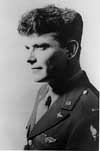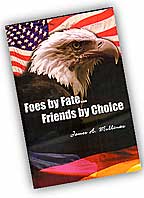|
LIFE AS A POW at Stalag Luft 1 About 5 to 9 months before the end of the war, a fellow POW I knew slightly, came to me and explained that our Senior Officer was organizing a group. My name was on his list as a possible member of that group because I could speak and understand the Slavic language. Interpreters were needed. To join or not was voluntary, and the messenger said that if I chose not to join, our conversation would cease right there. I considered it for a second, after which I told him I would do it. He then told me that our conversation was not to be repeated to any one, not even my room mates. When the time came, I would be notified what to do. In the meantime I was to carry on as I had before. My name may have been placed on the Senior Officer's list by the head of the Intelligence and Escape committee. Both of us were in the first group of Allied men to occupy Stalag Luft 1. Members in this group were chosen to head the committees that ran the camp. {They were} chosen by a Major, our Senior Officer at that time. The head of the escape committee knew I could speak and understand the Slavic language, because {of what happened} on the night of our arrival at Stalag Luft 1. Some Blokes from the RAF came through the building asking if there was anyone in the group that understood Czech. I admitted that I did, and we conversed in Czech. There was more of a kinship between the members of the first group of men in the camp, than with the rest of the POW's {who arrived} later on. We awoke one morning to a lot of yelling, cheering and just plain noise. The early birds had discovered that the German guards were gone. All gone. The Germans had quietly moved out during the night. Not only out of our camp but out of the area. The city police and all government people had gone too. Presumably they had fled to the West towards the Allies. They were deathly afraid of the Russians. And for good reason. The Russian troops were mostly Mongolian. They were front line troops, used for cannon fodder. Their lives weren't worth spit, and that's the way they treated the occupied country and its people. The Germans that fled West knew this. Many of the women that could not flee were raped repeatedly. One of our group found three women lying on the Baltic Sea beach. A grandmother, a mother and a daughter. They had committed suicide rather than go through what the Russians would do to them. There were liberated slaves of the Germans roaming the countryside also - Italians, French, Poles, Hollanders, Belgians, Czechs and others. These slaves had terrorized the {German} people before the Russians came. The Russian Army moved in {to our camp} 4 or 5 days after the guards had abandoned us. A Russian guard was usually posted by the Russians with each of the Field Forces guards. These Russians were usually very young [teen agers], and very friendly. often there would be two of them. They had guns similar to our Thomson sub-machine gun, only tinier. They would be issued their ration of ammunition in the morning as they went on guard duty. In about thirty minutes of guard duty they had shot up their ammunition. They would shoot anything - tin cans, fence posts and holes in the sky. It was from one such guard that I got my Walther p-38 and other souvenirs. He explained that when he and many of his fellow soldiers were drafted into the army, their army did not have any guns and other equipment so necessary for a soldier. That they would equip themselves with equipment taken from dead German soldiers - often one they had killed by sneaking up on him. He gave me the items with the comment that he had plenty more. My duty as a guard was to prevent anyone from entering the camp, and to prevent any of our own from leaving. This was for their own protection. There was no order out there. We stopped many former slaves from entering the camp. They would come searching for what they could find. We could not offer them much of anything. We had little food. {There were} only two doctors, and the only medicine they had was aspirin. If {the slaves} had a legitimate reason and persisted, we would pass them on to people assigned to that duty. One day an apparition came down the road from town. He was tall, and just skin and bones. I understood from him that he was Dutch, and that he had been a slave working at the airfield which was about four miles from Stalag Luft 1. He had been chained to a turret lathe. We passed him on into our camp for the doctors to try and help him. I do not know if he survived. I doubt that he did. One evening I served as an interpreter at a dinner for a young Russian officer. He was of a low rank and had been sent to the POW camp by his superiors to check it out. He wasn't very talkative, and {we} had trouble understanding {each other}. One day I was assigned to go into town with two other POW's; one a German speaker and {the other} a car driver. The car had been acquired by the commanding officer somehow. We were to pick up two German men that were familiar with the {water} pumps serving the camp and the flak school about a quarter of a mile from us. The pumps had quit and there was no water in the POW camp. We picked up the mechanics at an address in town. On the way back to camp we passed several groups of Russian soldiers as they were coming in and occupying the area. We approached a small bridge across a ten foot wide stream that was under Russian guard. As our driver approached the bridge he failed to heed the order to stop by the Russians. Stalag Luft 1 was located in the Russian occupied area of Germany. In order to come in and evacuate us, our government had to get permission to enter the Russian occupied area. During this period, the Allies were meeting in San Francisco setting up the United Nations. As usual, the Russians [Stalin] were obstinate and would not give permission. Eventually they did. I don't know what we gave up {for this}. The evacuation started on or about 11 May {1945}. B-17's were used. The former POW's were transported by truck from the camp through the town of Barth, to the airfield about 3 miles from the camp. To prevent Germans or their former slaves from taking advantage of this evacuation, Field Forces were stationed along the route from Stalag Luft 1. {This was} to prevent them from boarding the trucks or the B-17's. The flying forts would land, taxi to the loading area and leave their motors running as the Kriegies were loaded. As the last of the Kriegies left Stalag Luft 1 on the trucks, another truck picked up the Field Forces guards as it went to the airfield. I was one of the Field Forces on guard duty. I was on the last truck, and on the next to last B-17 to leave Barth. We landed at Rheims, France. From there we were transported to camp Lucky Strike. Our {German} guards {at the POW camp} and civil service people of the town and surrounding area had left on or about 1 May. I believe I arrived at camp Lucky Strike on or about 13 May. There were other camps for RAMPS [Recovered Allied Military Personnel]. Camp Lucky Strike was a tent city as, I imagine, were the others. Quite a few of us visited Paris during our stay at Lucky Strike. We had no money, but no matter, there was usually a way. In Paris, we heard a rumor that a paymaster was issuing back pay to RAMPS. We found the place, and amazingly {the paymaster} was issuing limited amounts of back pay, depending on the length of time as a POW. We had no ID, but he accepted the name, serial number and time as a POW given to him. We found the central mess for American service men in Paris. That solved our food problem. We soon discovered that riding the Paris subway was free to American service men. After about a week in Paris, we heard that the unit we were assigned to was close to being processed for deployment back to the states. Introduction Mission Overview My 2nd Schweinfurt Life as a POW |


